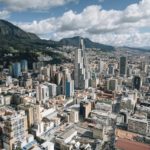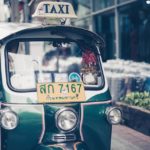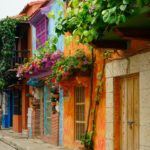Living in Bogota: 5 Things That Colombians Tell Me About Myself

It’s been a year now since I moved from my hometown, London, to Bogota, the capital of Colombia, and something I’ve noticed is the way in which identity is defined. I’ve noticed that here I have taken on a number of identities which just didn’t matter or exist when I was in London. Not that we don’t categorise people there too – for example, a person’s age, ethnicity and the part of London they’re from can tell you a lot about them: how they grew up, the communities they grew up in, the cultures they will have been exposed to.
Here I’ve decided to explore my various Colombian identities while living in Bogota:
Living in Bogota: 5 Things That Colombians Tell Me About Myself
1. I’m a gringa.
I’m actually British; however, here, as I am a foreigner who speaks English, I’m a gringa. The term ‘gringo’ was initially coined by Spanish-speakers to refer to English-speaking people, and nowadays is often used by Latin Americans to refer to North Americans; but as few people here will be able to distinguish between the different accents, if you look foreign and are speaking English, you’re a gringo/a.
If you’re an English speaker, expect at some point to be asked if you’ll give private English classes.
2. I’m an English teacher.
Being a native English speaker, I’m also a potential English teacher (whether or not that’s what I actually am – but I am, as it happens!).
There is a massive demand for English in Bogota; this is partly due to many national and multi-national companies requiring their employees to have at least an intermediate level of English, and universities requiring their students to demonstrate that they have a particular level of English (by taking the TOEFL or IELTS exam) before they are able to graduate in any subject.
So if you’re an English speaker, expect at some point to be asked if you’ll give private English classes.
3. I’m a Modern Languages graduate (a teacher/translator) because ‘you are what you studied.’
Who are you? What’s your profession? (i.e. what did you study?). Here, I’m a Modern Languages graduate (and therefore most likely a teacher or translator by default). In Colombia, you are what you studied and it is difficult, if not impossible, to escape from that pigeon-hole once you’re in it.
This means that if you studied Electronic Engineering, then that’s who you are; you’re an Electronic Engineer (and that’s how you’ll be introduced, or be expected to introduce yourself). If you studied Computer Science, then you’re a Systems Engineer. If you studied Business Administration, you’re a Business Administrator.
In the UK, it’s very common to study a particular degree at university and then end up in a completely unrelated career. For example, although I’m a languages graduate, I could fairly easily enroll on a Law conversion course and nurture aspirations to become a lawyer if I wanted to.
In Bogota, it is very difficult to follow a career which is not directly related to your degree, because Colombian companies see your degree and your career as synonymous. If you want a job in marketing, you have to have a degree in marketing. Languages graduates become teachers or translators. Full-stop.
They will ask “Why the change?” before judging you to be indecisive and (more often than not) striking you off.
In Colombia, students typically finish school at 16 and then apply to do a five-year degree at university. So at 16, young people have to make a decision about who they want to be for the rest of their lives – because once you’re a lawyer, that’s it – that’s what and who you are.
And if you’ve done a Masters in an unrelated subject, you’d better get ready to apologise for it, because employers usually won’t get it. They will ask “Why the change?” before judging you to be indecisive and (more often than not) striking you off.
In Colombia, your university degree becomes a permanent brand on your identity, and the only way to escape the pigeon-hole is to set up your own business, or leave Colombia (and many people do both of these things).
4. I’m a ‘wife.’
If you live with your boyfriend/girlfriend in Colombia, you are also a husband/wife (esposo/esposa), regardless of whether anyone’s put a ring on it (and they often haven’t). Because in Colombia, living with a partner is equated to being married, even by law once you’ve lived together for two years.
5. I’m ‘estrato 4.’
Where do you live in Bogota? i.e. “What estrato are you?” Are you “estrato 6” and therefore automatically assumed to be a member of Bogota ‘High Society’? Are you “estrato 4,” and living a comfortable middle-class life? Or are you “estrato 1 – 2,” poor, exempt from taxes, and viewed with disdain by many from the other estratos?
You see, the city and its residential buildings are divided into six estratos, or strata, and these are an indication of the social position of the people who live in a particular area or building; the cost of your bills will depend on your estrato and you will need to be aware of this when looking for somewhere to rent.
It is a suggestion to others of the quality of life you lead, your position in society, the type of job you’re likely to have, how much you’re likely to be earning, who you are likely to be associating with.
It is a system, which was initially devised as a means of ensuring that people paid what they could afford to for their utility bills. People living in an estrato 6 area will often spend hundreds of dollars a month on their bills. Meanwhile someone in estrato 4 will pay half that amount for the same usage, and, in turn, someone in estrato 1 will pay next to nothing in comparison.
This is, in theory, a fair system. But, your estrato in Bogota has come to mean so much more than how much you pay for your bills. It is a suggestion to others of the quality of life you lead, your position in society, the type of job you’re likely to have, how much you’re likely to be earning, who you are likely to be associating with. Some have even referred to this system of strata as a form of ‘caste system’. Because in Bogota, it’s not just that you live in estrato 4, you are estrato 4.
In conclusion, it’s a good idea to come to Bogota with a strong sense of who you are and who you want to be; because if you’re not sure, Colombia will gladly tell you, whether you like it or not.
Living in Bogota: 5 Things That Colombians Tell Me About Myself
Related Reading
Ignore the Media. Travel to Colombia!
Do you have experience living in Bogota? What was your experience like? Email us at [email protected] for information about sharing your experience and advice with the Pink Pangea community. We can’t wait to hear from you.
Living in Bogota: 5 Things That Colombians Tell Me About Myself photo credit: Naomi Dalton.









When it comes to other people telling you who you are, you must prove them wrong.
I do not let or even care what others think of me. I know who I am. I know what I want to do and where I want to go. Those 3 things are what matters to me more.